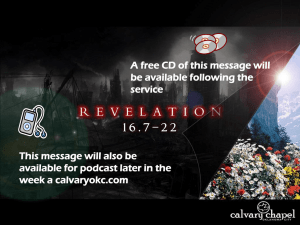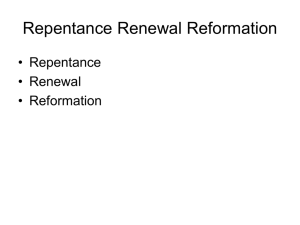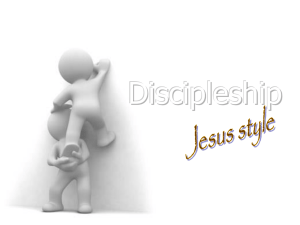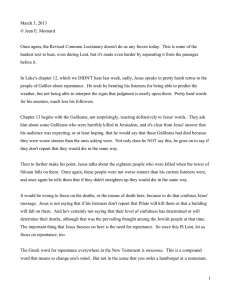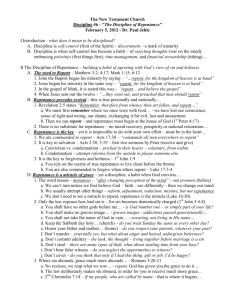Ever come to church hoping to be comforted, to be... to have the preacher preach hellfire and brimstone or step...
advertisement
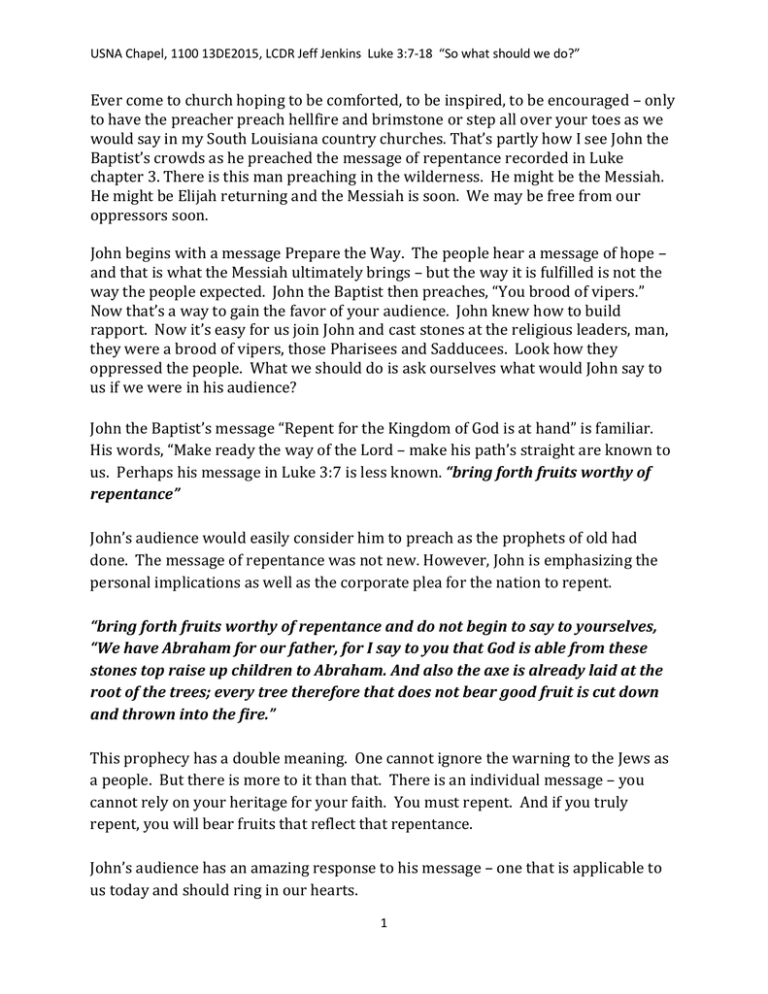
USNA Chapel, 1100 13DE2015, LCDR Jeff Jenkins Luke 3:7-18 “So what should we do?” Ever come to church hoping to be comforted, to be inspired, to be encouraged – only to have the preacher preach hellfire and brimstone or step all over your toes as we would say in my South Louisiana country churches. That’s partly how I see John the Baptist’s crowds as he preached the message of repentance recorded in Luke chapter 3. There is this man preaching in the wilderness. He might be the Messiah. He might be Elijah returning and the Messiah is soon. We may be free from our oppressors soon. John begins with a message Prepare the Way. The people hear a message of hope – and that is what the Messiah ultimately brings – but the way it is fulfilled is not the way the people expected. John the Baptist then preaches, “You brood of vipers.” Now that’s a way to gain the favor of your audience. John knew how to build rapport. Now it’s easy for us join John and cast stones at the religious leaders, man, they were a brood of vipers, those Pharisees and Sadducees. Look how they oppressed the people. What we should do is ask ourselves what would John say to us if we were in his audience? John the Baptist’s message “Repent for the Kingdom of God is at hand” is familiar. His words, “Make ready the way of the Lord – make his path’s straight are known to us. Perhaps his message in Luke 3:7 is less known. “bring forth fruits worthy of repentance” John’s audience would easily consider him to preach as the prophets of old had done. The message of repentance was not new. However, John is emphasizing the personal implications as well as the corporate plea for the nation to repent. “bring forth fruits worthy of repentance and do not begin to say to yourselves, “We have Abraham for our father, for I say to you that God is able from these stones top raise up children to Abraham. And also the axe is already laid at the root of the trees; every tree therefore that does not bear good fruit is cut down and thrown into the fire.” This prophecy has a double meaning. One cannot ignore the warning to the Jews as a people. But there is more to it than that. There is an individual message – you cannot rely on your heritage for your faith. You must repent. And if you truly repent, you will bear fruits that reflect that repentance. John’s audience has an amazing response to his message – one that is applicable to us today and should ring in our hearts. 1 USNA Chapel, 1100 13DE2015, LCDR Jeff Jenkins Luke 3:7-18 “So what should we do?” Luke 3:10 “And the multitudes were questioning him, saying, ‘What shall we do?’ John replied, “If you have two coats give one to the man who has none.” The tax collectors came to be baptized and likewise asked, “Teacher, what shall we do?” “Collect no more than what you have been ordered.” Some soldiers came, “and what about us, what shall we do?” “Do not take money by force or accuse anyone falsely. Be content with your wages.” John preached “bring forth fruits in keeping with repentance. We should respond the same as his original audience.“ What then should we do?” Now you’ve heard me preach several times now and you are starting to learn that I like to pose questions for you. Questions engage our brain and help us to apply scripture to our lives. After all, if we don’t apply and make changes, what difference does it make? This is the thrust of John’s message. For any scripture text that we read, we should be asking ourselves questions. We take the truth that comes from the text and then make the application to our situation. 1. Is there a theological truth I need to learn? - Yes, the Messiah is coming and will separate the wheat from the chaff. We should prepare the way. - That message is still true today as we anticipate his second coming. 2. Is there a command I need to obey? - Yes, repent! - Just as John warned “do not say that we have Abraham as our father” we cannot rest on the faith of our families. We cannot go through the motions of religion, church attendance, doing our duties. - We must personally repent of our sin. 3. Is there an example that I need to follow or avoid? - “you as an individual must also ask what should I do in response to the call to repentance.” - This is where I want to focus today. 2 USNA Chapel, 1100 13DE2015, LCDR Jeff Jenkins Luke 3:7-18 “So what should we do?” John “Therefore bring forth fruits in keeping with repentance” The crowd – what do we do? If you have two coats, give one to the poor. The tax collector – take only what is required. The soldier – don’t use force to coerce others to your will. Well we can certainly donate coats to the needy but not many of us are tax collectors. We are a military congregation but the UCMJ provides protections and then some to prevent us from coercing others. So what do we do? The principle is, “If we say that we have repented, it should be reflected in the way we treat others.” Jesus gave a similar command and in fact used the same analogy of bearing fruit and cutting down the tree that fails to bear fruit. Matthew 7:15-20 Beware of false prophets, who come to you in sheep’s clothing, but inwardly are ravenous wolves. You will know them by their fruits. Grapes are not gathered from thorn bushes, nor figs from thistles are they? Even so, every good tree bears good fruit; but the bad tree bears bad fruit. A good tree cannot produce bad fruit, nor can a bad tree produce good fruit. Every tree that does not bear good fruit is cut down and thrown into the fire. So then, you will KNOW THEM by their fruits.” Are John and Jesus saying that we saved by works? Absolutely not. They are saying that if there is no fruit as evidence of repentance, then one never truly repented and thus never entered into a personal relationship with Christ. Charles Hodge, a noted Presbyterian theologian and principal of Princeton Theological for two decades in the mid 1800’s said, “Repentance is incomplete unless it leads us to confession and restitution in cases of injury; unless it causes us to forsake not merely outwards sins, which others notice, but those which lie concealed in the heart; unless it makes us choose the service of God and live not for ourselves but for Him.” Why was John preaching his message of repentance? 3 USNA Chapel, 1100 13DE2015, LCDR Jeff Jenkins Luke 3:7-18 “So what should we do?” Because he was preparing for the coming of the Messiah. John continued, "he will thresh wheat from the chaff". Jesus was already walking on earth. His earthly ministry was imminent. Today we look to his imminent return. Do you know that Johns message still rings true? Prepare the way. And his plea to individuals is still valid. Therefore bear the fruits of repentance! My Dad recently shared a sad fact that he’d heard. I tried it out and encourage you to do the same after church. Open Google. Type “Why are Christians . . .” The first autosuggestion is so mean. The second is so cheesy. John preached prepare the way for the first coming of the Messiah. We must prepare the way for the second coming of the Messiah. Are we doing a good job if the first hit on google is “Why are Christians so mean?” I think there is a parallel to John’s audience who professed one faith but lived another. “What then should we do?” Ask yourself today: 1. Have I confessed my sin and repented? 2. Are my interactions with others reflecting the fruit of repentance? 3. Are my thoughts of my heart reflective of the fruit of repentance? 4. Am I setting an example of a Christian that others should follow or that others should avoid? The King is coming. Prepare your heart and may it be reflected in your actions. Almighty God, creator of the universe. What do I need to do to prepare for your sons second coming. What do I need to change to bear the fruits of repentance. Amen 4


